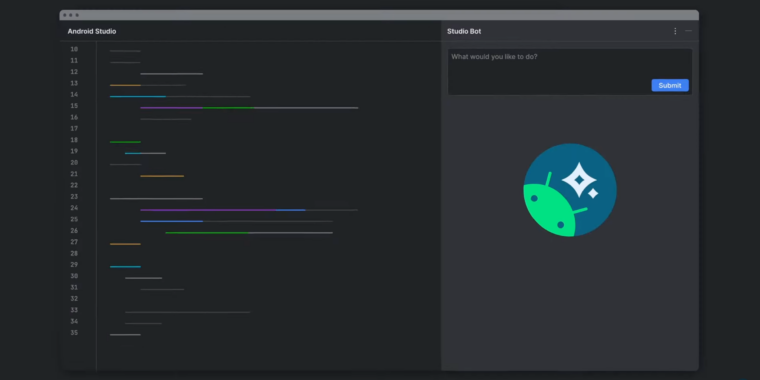
During today’s I/O presentation, Google announced Studio Bot, an AI assistant that Android developers can use to write and debug code.
Built on Codey and the revised major language model PaLM 2, Studio Bot is only available to US developers for now and is still in its “very early days,” according to Google. It’s part of Android Studio, Google’s official integrated development environment (IDE) for Android developers.
This is distinct from another Codey-based project that aims to compete directly with GitHub’s Copilot in finalizing and generating in-line code.
While Copilot is focused on directly analyzing the user’s code and making suggestions in-line, Studio Bot behaves much like Bard or ChatGPT in that it’s a “conversational experience” that interacts with you like a kind of advisor. A promotional video announcing Studio Bot depicted a developer asking “What is a dark theme” (as if any self-respecting developer wouldn’t know) and then asking follow-up questions to get code snippets to implement a dark theme in the developer’s design. app.
You don’t have to give Studio Bot any of your code to ask it things. In fact, Google’s positioning suggests that, at least for now, it’s better suited to answering common API questions and the like than digging you in and helping you build things directly.
Google warns in its developer documentation that “Studio Bot is still an early experiment and can sometimes provide inaccurate, misleading, or false information while confidently presented. Studio Bot may give you working code that doesn’t produce the output you expect, or provide you with code that is not optimal or incomplete.”
A short video Google made to demonstrate an AI bot in Android Studio.
This wasn’t the only I/O announcement relevant to developers. As briefly mentioned above, Google also announced plans to launch a Codey-based code generation tool more similar to Copilot. Code-based tools like this work with JavaScript, Java, Python, SQL, and Go. This is part of a larger initiative to make virtually all Google Cloud and the other Google AI development tools and services over time.
Google also launched ML Hub, a repository of guidelines for developers who want to train and use machine learning models in their work. And with a new experimental AI feature in the Play Store, developers can generate copies for app listings, analyze and summarize app user reviews, and more.

